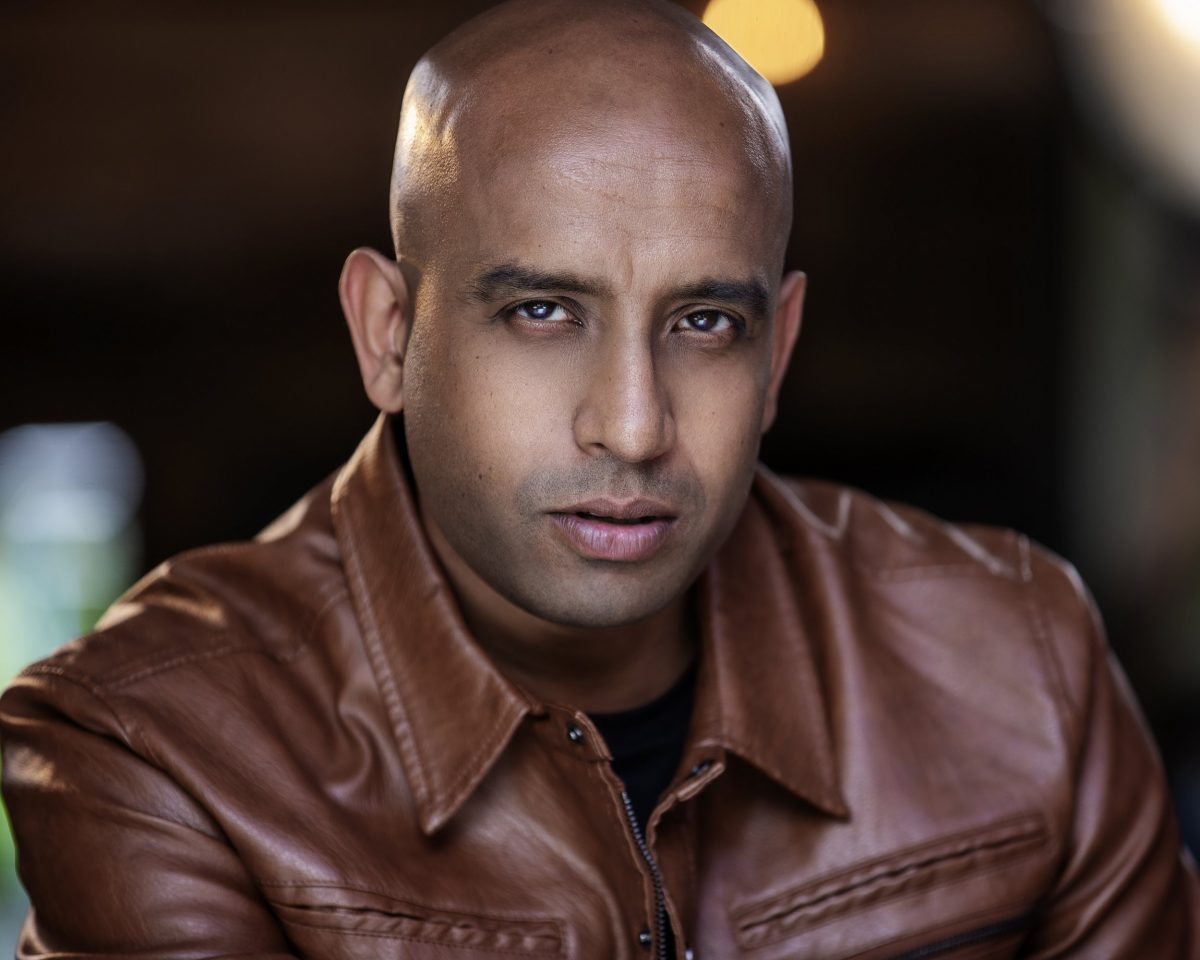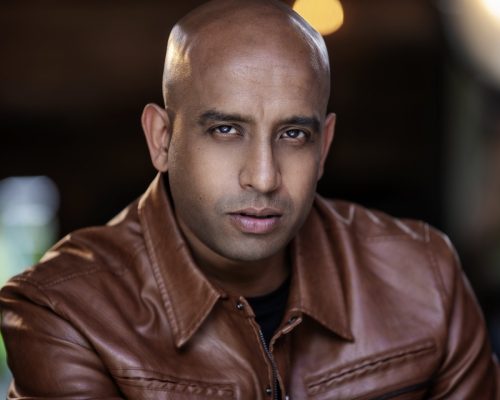 Rex Dane recounts his trying Hollywood journey chasing the American dream
Rex Dane recounts his trying Hollywood journey chasing the American dream
It’s always exciting to hear of success stories. Stories that inspire, create awe and stories that give hope to the underdogs. But here is the bitter thing about life – every success story that reaches you, comes riding on hundreds of other stories of unsung heroes, lost dreams and people who tried hard but couldn’t make it.
Rex Dane, a Los Angeles-based actor of Indian descent, who just announced his bankruptcy, talks to the American Bazaar about his trying Hollywood journey.
The Screen Actors Guild member is the writer and director of his first production ‘Shiva’ — a short teaser version of a story he had in his heart for a long time but was rejected by numerous producers and investors.
Read: Indian who started America’s first male strip club (January 25, 2023)
He finally used his own resources to make this teaser which interestingly went on to win 19 awards at the international film circuits. According to Dane, he received 12 best actor awards for the short movie at festivals such as Rome International Movie Awards; Heart of Europe International Film Festival and Best Microfilm at Vegas Movie Awards among others.
Dane talks tells the American Bazaar how Hollywood may have failed him.
AB: Let’s begin with your early life in India. At what stage you decided you wanted to be an actor in Hollywood and why?
RD: I was born and raised in Kolkata, India. As a kid I used to watch a lot of movies and used to say the dialogues of my favorite movie stars in front of the mirror. I did not know anything about acting, had no aspirations to become an actor. I used to do it just because I liked doing it.
As years went by that started becoming an obsession and I was getting some kind of relief in doing it. I won’t be able to explain what it was but I felt a lot lighter when I did it.
The atmosphere I was growing up in was extremely toxic, and there was no way for me to get out of that situation. When I decided that acting was something I would like to pursue as a career, the situation in my house became scary. Even before I could get started I was forced to change directions.
I was officially declared as mentally ill. I was put on strong medications that were never necessary. That took a huge toll on my health. The whole situation became so toxic I didn’t think I’d live long. I decided to leave India. I wanted to come to the USA, but at the time Australia was the only option for me.
AB: Tell us about your life in Australia. At what stage did you turn towards Hollywood?
RD: When I arrived in Australia I knew that was the end of my aspirations to become an actor, because I could not speak English. Also, the effect of those medications I was on for years changed my thought patterns, I didn’t even want to pursue an acting career anymore.
I felt that it would be ludicrous to pursue something like that in life. Somewhere inside I knew whatever I am doing and thinking this is not the real me but it was too late.
Those meds already took control of my brain by then, I was living like a robot controlled with a remote. I remember one doctor in Australia told me that I do not have any disease that would require me to take those anti-psychotic meds, those were totally unnecessary and wrongly prescribed to me in the first place.
I had to first come out of those medications but it was practically impossible, the withdrawal effects were intolerable. I gave it around 6 to 8 months and was finally able to come out of those meds.
As I came out of those meds, my thinking patterns started changing back to where it was years before, and I started liking acting again but my English was still not good enough.
As years went by, people started telling me that I don’t sound like a typical Indian guy and everyone I would meet would say the same. By this time, even though I had an accent I had a good grasp of the language so I quit everything and moved to Sydney to pursue acting.
When I moved to Sydney a lot of people said I should try in Bollywood, but I can’t speak Hindi, so that was not an option for me. Also, the darkness I went through in India, I did not feel comfortable and safe to make a permanent move back to India.
I was working in Sydney as an actor but there was not much work there. With the help of a lot of people I was able to move to the USA.
AB: So, is it where your American Dream started? What were your initial years like?
RD: I moved to Los Angeles in 2017. I was 22 and did not really know anyone in this country. So, it was obviously a bit of a challenge to get everything set up. But as far as acting was concerned, I saw no hope.
I did not have an agent here, there was work but I was not getting any. This city is expensive, so I was doing all kinds of odd jobs to pay my bills, driving, picking up dirty plates in restaurants etc.
Because I always carried a good physique I was advised to do small stints in pornography, as much as it was enticing money wise I didn’t fall for that shortcut.
AB: How did your feature Shiva come about?
RD: I was practically home most times, drinking the whole day. I used to write small scenes when I was acting in Australia, so here in LA because I had no work I started writing small scenes.
And slowly I was getting a feeling that I could join those scenes and create a story. I ended up writing a feature length screenplay ‘Shiva.’ This was my first screenplay ever.
Initially I was told the script sucks, I am a bad writer, non-writer etc. no production companies were interested to even read the synopsis. That’s when I started sending that script out to the competitions and festivals, and I ended up with over a dozen awards for that screenplay.
Then the production houses started showing interest in the story but no one was interested in casting me in the main role, a role that I wrote for myself.
And I can’t complain, because why would anybody risk investing in me, I don’t have a face value. Although I knew I could do the job, how would I justify to the investors that I could do it?
AB: Did the project financially drain you? How has it been like trying to sustain your own project?
RD: I do not have the resources to produce the whole movie, so I decided to produce a teaser version of the story, so the producers and investors can visually see what this story would be like with me in the lead role.
But I didn’t have enough money to even produce the teaser. I tried to save up for years but I couldn’t. So finally, I decided to use my credit cards to produce this teaser film. From the financial standpoint, it was a huge risk but I felt this was one of the most important pursuits of my life, so I did it.
This was my first production, and so I guess I was not good enough to do all the budgets properly, as things started the budget started going through the roof and I ended up exhausting all the credits cards I had.
I was still hoping that I would be able to repay all my debts within a few years, but the interest rates were so high and my financial situation and my earnings went so bad that I saw no hope of repaying the debt, the debt kept piling up and up because interest was accumulating at a very fast pace.
Something I am not proud of and I never will be, I applied for bankruptcy. Today, I am jobless and I am officially bankrupt. I don’t know how I will pay my rent next month.
AB: Where do you find yourself now in your Hollywood journey?
RD: Even though today I am bankrupt, I still keep my hopes high. I understand filmmaking is a business, and I have proved repeatedly that the story is a hit story.
I have also proved that as an actor I can justify the lead role so I have done everything in my power to clear any doubts the producers or investors would have.
This teaser film/trailer received 19 awards, including 12 Best Actor awards for my performance in it. I am still hoping someone would like the story I have written and make the film with me.
Shiva is an unfinished love story that will take the viewers on a powerful journey of highs and lows that will keep them on the edge of their seats throughout.
This is not an Indian story, this is not an American story, this is a multicultural film, that many would be able to relate to themselves.



